Researcher Honored for Mitochondrial Work
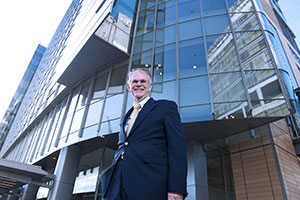
“Mitochondria” may sound vaguely familiar to anyone who learned about cell functions and structures in high school biology. These specialized subcellular structures play a crucial role, by extracting energy from food. Simply put, mitochondria are the tiny “power plants” within the cytoplasm of animal and plant cells.
Mitochondrial function plays essential roles across the human lifespan, in both rare and common childhood diseases, in adult-onset metabolic and degenerative diseases, and in cancer and aging. What high school students don’t learn is that Douglas C. Wallace, PhD, director of the Center for Mitochondrial and Epigenomic Medicine at Children’s Hospital, is widely considered the founder of mitochondrial genetics in humans. Dr. Wallace has conducted ground-breaking research into the mysteries of mitochondria and its role in the development of disease.
The Gruber Foundation honored Wallace with the 2012 Genetics Prize on Nov. 9 at the annual meeting of the American Society of Human Genetics in San Francisco. The prestigious international award — a $500,000 prize — recognizes Dr. Wallace’s pioneering scientific investigations of the wide-ranging role of mitochondria in the development of disease and as markers of human evolution. Based at Yale University, the Gruber Foundation’s Genetics Prize annually honors leading scientists for groundbreaking contributions to genetics research.
Dr. Wallace joined Children’s Hospital in 2010 to launch the Center for Mitochondrial and Epigenomic Medicine. The Center researches mitochondrial dysfunction in many clinical problems, and also focuses on preclinical studies relevant to developing therapies for mitochondrial diseases, for which few effective clinical treatments currently exist.
Dr. Wallace and his colleagues also have linked mutations in mitochondrial DNA to a broad range of human diseases, including types of blindness, deafness, metabolic disorders such as diabetes, neuropsychiatric conditions, and age-related diseases such as heart disease and cancer.
“The Children’s Hospital of Philadelphia Research Institute is privileged to number Douglas Wallace among our research leaders,” says Philip R. Johnson, MD, the Hospital’s chief scientific officer. “His commitment to the field of mitochondrial genetics and his pioneering nature embody the mission of research at CHOP, and his research and leadership are shaping the way we approach therapies for genetic disorders previously considered beyond treatment.”
Dr. Wallace first gained prominence in the scientific community in the 1970s as the leader of a research team at Stanford University that defined the genetics of mitochondrial DNA. This DNA, which resides within each mitochondrion, is distinct from nuclear DNA found inside chromosomes. Dr. Wallace’s group discovered that human mitochondrial DNA is inherited exclusively from the mother.
Building on his maternal inheritance discovery, Dr. Wallace identified the first inherited mitochondrial DNA disease, Leber’s hereditary optic neuropathy, which causes sudden blindness. He subsequently linked mitochondrial DNA mutations to a wide range of other clinical symptoms, including deafness, neuropsychiatric disorders, cardiac and muscle problems, and metabolic diseases such as diabetes. Significantly, Dr. Wallace also showed that mitochondrial DNA mutations accumulate in human tissue with age, and therefore play a role in age-related diseases, such as heart disease, cancer, and dementia.
Today, Dr. Wallace and his team are studying the potential role mitochondrial DNA plays in common diseases including autism, epilepsy, heart disease, diabetes and obesity, forms of blindness, Alzheimer and Parkinson disease, cancer, and aging.
Dr. Wallace holds the Michael and Charles Barnett Endowed Chair in Pediatric Mitochondrial Medicine at Children’s Hospital and also is a professor of Pathology and Laboratory Medicine in the Perelman School of Medicine at the University of Pennsylvania. He is a member of the National Academy of Sciences, the nation’s premier organization of leading researchers, as well as the Academy’s Institute of Medicine, and is also a member of the American Academy of Arts and Sciences.
Cancer Expert Joins Elite Honorary Society
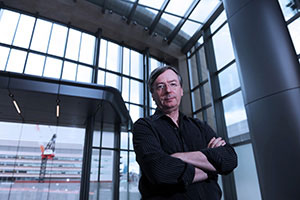
An expert in childhood brain cancer at CHOP is in the elite company of Secretary of State Hillary Clinton, musician Paul McCartney, playwright Neil Simon, musician and conductor Andre Previn, and actor-filmmakers Clint Eastwood and Mel Brooks as part of the 2012 class of the American Academy of Arts and Sciences.
The Academy, one of the nation’s most prestigious honorary societies as well as a leading center for independent policy research, elected Tom Curran, PhD, FRS, to join the select and highly diverse group.
The 2012 class was inducted on Oct. 6, at the Academy’s headquarters in Cambridge, Mass. Dr. Curran joins a select group of scholars, scientists, writers, artists, civic, corporate and philanthropic leaders that includes winners of the National Medal of Science, the Lasker Award, the Fields Medal, Pulitzer Prize awardees, and winners of MacArthur Fellowships, Oscar, Emmy, Grammy and Tony Awards, and Kennedy Center honors. Fellow scientific inductees to the 220-member class include cancer researcher Brian Druker and astronomer Debra Ann Fischer.
Dr. Curran’s research targets the molecular biology of the brain’s growth and development to find new treatments for childhood brain tumors. He has been awarded grants from the National Cancer Institute and the National Institute of Neurological Disorders and Stroke, as well as from private foundations.
He currently is the deputy scientific director of The Children’s Hospital of Philadelphia Research Institute and is a professor of Pathology and Laboratory Medicine and professor of Cell and Developmental Biology at the Perelman School of Medicine at the University of Pennsylvania.
Born in Scotland, Dr. Curran earned his PhD from University College London. He was the founding chairman of the Department of Developmental Biology at St. Jude’s Research Hospital before joining Children’s Hospital in 2006. Dr. Curran is an elected member of the Royal Society in the United Kingdom, as well as the Institute of Medicine in the U.S. He is a former president of the American Association of Cancer Research.
Founded in 1780 by John Adams, John Hancock, and other scholar-patriots, the Academy elects leading “thinkers and doers” from each generation. Past members have included George Washington, Benjamin Franklin, Daniel Webster, Ralph Waldo Emerson, Albert Einstein, and Winston Churchill.
The current membership includes more than 250 Nobel laureates and more than 60 Pulitzer Prize winners.
Injury Investigator Testifies Before Congress
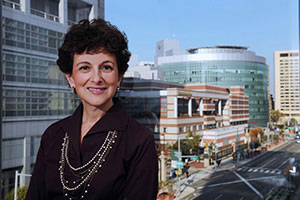
Traumatic brain injury (TBI) is the leading cause of injury-related death in children, resulting in more than 6,000 deaths and hospitalizing 60,000 children and adolescents each year. Every day, more than 125 children die or are hospitalized with TBIs that, sadly, are caused by largely preventable events, such as car crashes and sports accidents.
The cost to families and society is enormous. On average, the annual cost of children dying from a TBI is $29 billion and $53 billion for those who are hospitalized, according to Flaura K. Winston, MD, PhD, director of the Center for Injury Research and Prevention (CIRP) at Children’s Hospital, who recently presented findings to a Congressional committee.
Dr. Winston, along with several other TBI experts, testified March 19 before the House Energy and Commerce Committee’s Subcommittee on Health on the state of TBI prevention, treatment, recovery, related research, and federal efforts to address TBI. Dr. Winston, whose pioneering research has focused on preventing child occupant and teen driver deaths and injuries in motor vehicle crashes, pointed out that that the average medical cost for children hospitalized with TBI is $40,000. “That’s a lot of helmets,” she said.
But despite advances in preventing and treating traumatic brain injury, “We’re just beginning to understand the biomechanics of brains,” continued Dr. Winston. While many pediatric brain injuries are preventable, the science behind treating those injuries that do occur is limited, because most research has focused on adults. “Children are not small adults,” she emphasized.
In fact, recent developments have led researchers to question the traditional belief that children are more resilient than adults. Dr. Winston pointed out that researchers have seen a connection between an increase in disabilities and mild TBI in teenagers.
Noting that the “brain is the organ that is least able to heal,” Dr. Winston stressed the need for continued research to prevent and treat pediatric brain injuries. “New and improved child-focused strategies will only emerge from investments in basic and translational biomechanical, behavioral, and medical research to inform new safety products and their testing,” she said.
Federal funding has been “crucial” to brain injury research, said Dr. Winston. She called on the National Institutes of Health and other agencies to continue to invest in TBI research. “We need to build up our scientific foundation,” she said.
Vaccine Advocate Elected to Institute of Medicine

An outspoken advocate of the science, safety, and value of childhood vaccinations, who has fought misconceptions and controversies associated with such vaccinations, has been elected to the Institute of Medicine (IOM) at the National Academy of Sciences. Election to the IOM recognizes individuals who have demonstrated outstanding professional achievement and commitment to service.
Paul Offit, MD, a leading researcher in the fields of virology and immunology for three decades, is the director of the Vaccine Education Center and chief of Infectious Diseases at Children’s Hospital. The Vaccine Education Center was launched in October 2000 to provide accurate, comprehensive, and up-to-date information about vaccines and the diseases they prevent to parents and healthcare professionals. In addition, Dr. Offit holds the Maurice R. Hilleman Endowed Chair in Vaccinology and is a Professor of Pediatrics at the University of Pennsylvania’s Perelman School of Medicine.
The IOM announced the names of 65 new members and five foreign associates on October 17, 2011. Established in 1970 by the Academy of Natural Sciences, the IOM honors professional achievements in the health sciences and serves as a national resource for independent analysis and recommendations on issues related to medicine, biomedical sciences, and health.
A pediatrician specializing in infectious diseases, Dr. Offit dedicated 25 years to the development of RotaTeq, one of two vaccines currently used to fight rotavirus, a disease that is the leading cause of severe, dehydrating diarrhea in infants and young children. RotaTeq is recommended for universal use in infants by the Centers for Disease Control and Prevention and has the capacity to save as many as 2,000 lives per day.
He is one of the most public faces of the scientific consensus that vaccines have no association with autism. Through his advocacy, Dr. Offit has successfully helped to educate parents about the health benefits of vaccinating their children.
Dr. Offit is the co-editor of the foremost vaccine text, Vaccines, and he has published more than 130 papers in medical and scientific journals. Dr. Offit is also the author or co-author of several books including: Breaking the Antibiotic Habit: A Parent's Guide to Coughs, Colds, Ear Infections, and Sore Throats (Wiley, 1999); Autism's False Prophets (Columbia University Press, 2008); Deadly Choices: How the Anti-Vaccine Movement Threatens Us All (Basic Books, 2011); and Vaccines and Your Child: Separating Fact from Fiction (Columbia University Press, 2011).
Dr. Offit is the eighth physician or researcher from Children’s Hospital to be elected to the IOM. After receiving his bachelor of science degree from Tufts University, he earned a medical degree from the University of Maryland School of Medicine. Dr. Offit completed his residency at the Children’s Hospital of Pittsburgh and his fellowship in Infectious Diseases at The Children’s Hospital of Philadelphia.
Retired Rotovirus Vaccine Co-Developer Passes
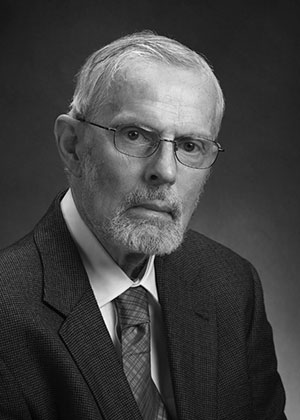
H Fred Clark, DVM, PhD, a retired research professor of Pediatrics at Children’s Hospital and the Perelman School of Medicine at the University of Pennsylvania, died on April 28. Dr. Clark, who helped develop a vaccine that has saved the lives of hundreds of thousands of children around the world, died of complications from heart and Parkinson’s diseases after a protracted illness. He was 72.
The Children’s Hospital of Philadelphia recognized Dr. Clark in 2006 with its highest honor, the Gold Medal, which is awarded to those who have had a profound impact on children’s health in the United States and internationally. The medal saluted Dr. Clark’s achievements as a co-inventor of the rotavirus vaccine, RotaTeq, along with fellow honorees Dr. Stanley Plotkin and Dr. Paul Offit. Rotavirus gastroenteritis is a common childhood illness that is the largest infectious-disease killer of infants and young children worldwide.
Dr. Clark earned a degree in veterinary medicine from Cornell University and a PhD in microbiology and immunology from the University of Buffalo. He studied and published extensively on both human and animal diseases, including rabies, tuberculosis, and hepatitis B, before joining Children’s Hospital in 1979, and concentrating on rotavirus research. Dr. Clark was also an adjunct professor at the Wistar Institute.
In addition to his research, Dr. Clark was a committed social activist. In the 1970s, he joined the Philadelphia chapter of Common Cause to advocate for a fair police complaint procedure, according to his wife, Karen. In the 1980s, Dr. Clark turned to peace activism to help prevent the proliferation of nuclear weapons.
Dr. Clark also devoted his time to providing care and support to Haitians who suffered from poverty and injustice. As members of the First United Methodist Church of Germantown, the Clarks participated in a program to help those in need in Fondwa, Haiti.
Dr. Clark is survived by his wife and their children.
CHOP Cancer Expert Featured at Annual Meeting
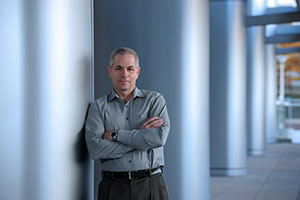
Neuroblastoma, a cancer of the peripheral nervous system, accounts for 7 percent of all childhood cancers, but because it frequently appears in an aggressive form, it causes approximately 12 percent of all childhood cancer deaths. In high-risk forms of neuroblastoma, the cancer tends to return after initial treatment, usually with deadly results.
The American Association for Cancer Research (AACR) highlighted this form of childhood cancer in one of a series of videos it presented at its 2012 annual meeting. John Maris, MD, director of the Center for Childhood Cancer Research at CHOP, was featured in the video describing how cancer research helped save the life of a young neurblastoma survivor. Dr. Maris is the first pediatric expert to be included in the AARC’s annual meeting videos.
The AACR annual meeting highlights the best and latest findings in all major areas of cancer research. Founded in 1907, the AACR is the oldest and largest scientific organization in the world focused on every aspect of high-quality, innovative cancer research. The AACR’s mission is to prevent and cure cancer through research, education, communication, and collaboration. More than 16,000 attendees participated in the 2012 annual meeting held March 31 to April 4.
Children’s Hospital has been using immunotherapy as part of standard treatment for childrens with high-risk neuroblastoma since 2009. Children from around the world have received this treatment at the Hospital, which has a long-established research and clinical program in neuroblastoma.
In 2010 Dr. Maris achieved what he called “a home run” in neuroblastoma research when he co-authored a study that examined the effects of immunotherapy — biologic agents that stimulate the body’s immune system — on neuroblastoma. The study showed that patients receiving immunotherapy experienced a 20 percent improvement in two-year survival rates.
“That is about as much of a home run as you can expect in a large, randomized Phase III clinical trial, and something that overnight changed the way that we approach the disease, and has led to the implementation of immunotherapy as now as a standard way to treat neuroblastoma to improve survival by preventing relapse,” explained Dr. Maris.
The Center for Childhood Cancer Research was established in 2007 and, under Dr. Maris’s leadership, has quickly become a highly integrated basic, translational and clinical research environment dedicated to eradicating the pain and suffering caused by cancer in children.
ADHD Expert Thomas Power Takes on New Roles
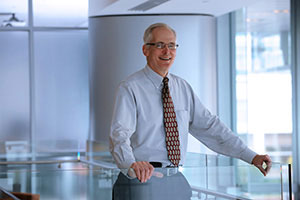
CHOP veteran child psychologist Thomas Power, PhD, recently received a new appointment, as associate chief of Academic Affairs and chief psychologist in the Department of Child and Adolescent Psychiatry and Behavioral Science.
Dr. Power, who has been with CHOP since 1984, was instrumental in founding the Hospital’s attention-deficit hyperactivity disorder (ADHD) program. The Center for Management of ADHD is now the region’s largest and most comprehensive center for diagnosing and treating learning and attention problems in children. A progression of appointments and accolades for Dr. Power followed, including his being appointed the director of the ADHD Center in 1999, and receiving a CHOP Mentor Award in 2009.
In addition to investigating the assessment and treatment of children with ADHD, Dr. Power has been very involved in prevention research in urban schools and other primary care settings, and has led a number of projects evaluating family-school interventions for children with ADHD. He is currently an associate editor of the journal School Mental Health, and serves as the president of the Society for the Study of School Psychology.
In his new role in the Department of Child and Adolescent Psychiatry and Behavioral Science, Dr. Power will provide leadership for the development of academic programs for the department, while acting as a mentor for faculty and professional development. In his role as chief psychologist he will provide oversight for psychology training programs and for the professional practice of psychologists at Children’s Hospital.
President’s Scholars Provide Vital Research Support
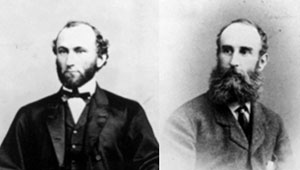
Financial support for research does not come solely through grants to investigators or funds budgeted by Children’s Hospital. Philanthropy is a critical element that allows Hospital investigators to explore new and novel ways to improve the health and well-being of children everywhere.
For nearly 25 years, the Endowed Chair Program at Children’s Hospital has provided valuable support to our physician-scientists who are pursuing innovative research ideas. Endowed chairs are named for an honoree and ensure that financial support for the chairholder’s work will continue in perpetuity.
The Endowed Chair Program at Children’s Hospital has expanded since its inception in 1988, and now includes more than 100 chairs. Eight new endowed chairs were established in FY12, among them three new President’s Scholars chairs that were established from an anonymous $12 million gift.
The President’s Scholars Program represents a new initiative at Children’s Hospital, one that aims to attract and retain the best and brightest scientific talent in pediatric medicine. President’s Scholar chairs provide a high level of endowed annual support for the chairholder’s work and help CHOP recruit and retain the very best minds in pediatric medicine.
The anonymous donor of the new President’s Scholar chairs chose to name them in honor of several CHOP pioneers, including two of the Hospital’s founding physicians — R.A.F. Penrose and T. Hewson Bache. Penrose specialized in diseases of women and children and served as Acting Assistant Surgeon in the Union Army during the Civil War. Later, he was instrumental in founding the American Gynecological Society. Bache, a great-great-grandson of Benjamin Franklin, served as an attending physician, manager and treasurer of Children’s Hospital.
Stewart A. Anderson, MD, will be the first to hold the R.A.F. Penrose Endowed Chair in Pediatrics. Dr. Anderson studies the development and functioning of specific neurons implicated in a number of illnesses, including epilepsy and schizophrenia. He also provides care for patients with schizophrenia.
Robert W. Doms, MD, PhD, the Hospital’s new Pathologist-in-Chief, will be the inaugural holder of the T. Hewson Bache Endowed Chair in Pediatrics. Dr. Doms is a nationally recognized HIV/AIDS researcher who has contributed to significant discoveries in the way the AIDS virus enters cells, as well as how the disease develops.
“To my way of thinking, success is directly tied to people and talent,” said Chief Scientific Officer Philip R. Johnson, MD “This program will give CHOP a leg up in our drive to attract the best people, who will in turn fulfill our quest to turn scientific discovery into medical innovation.”





